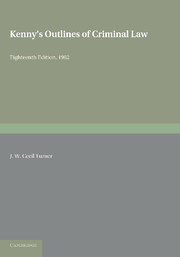Book contents
- Frontmatter
- Preface to the Sixteenth Edition
- Preface to The Seventeenth Edition
- Preface to the Eighteenth Edition
- Contents
- Index of cases
- Index to the principal statutes
- List of principal books cited
- BOOK I GENERAL CONSIDERATIONS
- BOOK II DEFINITIONS OF PARTICULAR CRIMES
- CHAPTER VII HOMICIDE
- CHAPTER VIII OFFENCES AGAINST THE PERSON THAT ARE NOT FATAL
- CHAPTER IX BIGAMY
- CHAPTER X CRIMINAL LIBEL
- CHAPTER XI OFFENCES AGAINST PROPERTY
- CHAPTER XII BURGLARY AND HOUSEBREAKING
- CHAPTER XIII STEALING
- CHAPTER XIV EMBEZZLEMENT
- CHAPTER XV FRAUDULENT CONVERSION
- CHAPTER XVI CHEATS PUNISHABLE AT COMMON LAW
- CHAPTER XVII FALSE PRETENCES
- CHAPTER XVIII RECEIVING STOLEN PROPERTY
- CHAPTER XIX OTHER OFFENCES INVOLVING FRAUD
- CHAPTER XX FORGERY
- CHAPTER XXI OFFENCES AGAINST THE STATE
- CHAPTER XXII CONSPIRACY AND INDUSTRIAL DISPUTES
- CHAPTER XXIII PERJURY AND OTHER OFFENCES AGAINST PUBLIC JUSTICE
- CHAPTER XXIV OFFENCES AGAINST INTERNATIONAL LAW
- CHAPTER XXV OFFENCES OF VAGRANCY
- BOOK III MODES OF JUDICIAL PROOF
- BOOK IV CRIMINAL PROCEDURE
- Appendix I The meaning of ‘credit’
- Appendix II II Rules as to admission of evidence which reveals to the jury facts discreditable to the person accused
- Appendix III III Forms of indictment
- Index
CHAPTER XV - FRAUDULENT CONVERSION
from BOOK II - DEFINITIONS OF PARTICULAR CRIMES
Published online by Cambridge University Press: 05 June 2016
- Frontmatter
- Preface to the Sixteenth Edition
- Preface to The Seventeenth Edition
- Preface to the Eighteenth Edition
- Contents
- Index of cases
- Index to the principal statutes
- List of principal books cited
- BOOK I GENERAL CONSIDERATIONS
- BOOK II DEFINITIONS OF PARTICULAR CRIMES
- CHAPTER VII HOMICIDE
- CHAPTER VIII OFFENCES AGAINST THE PERSON THAT ARE NOT FATAL
- CHAPTER IX BIGAMY
- CHAPTER X CRIMINAL LIBEL
- CHAPTER XI OFFENCES AGAINST PROPERTY
- CHAPTER XII BURGLARY AND HOUSEBREAKING
- CHAPTER XIII STEALING
- CHAPTER XIV EMBEZZLEMENT
- CHAPTER XV FRAUDULENT CONVERSION
- CHAPTER XVI CHEATS PUNISHABLE AT COMMON LAW
- CHAPTER XVII FALSE PRETENCES
- CHAPTER XVIII RECEIVING STOLEN PROPERTY
- CHAPTER XIX OTHER OFFENCES INVOLVING FRAUD
- CHAPTER XX FORGERY
- CHAPTER XXI OFFENCES AGAINST THE STATE
- CHAPTER XXII CONSPIRACY AND INDUSTRIAL DISPUTES
- CHAPTER XXIII PERJURY AND OTHER OFFENCES AGAINST PUBLIC JUSTICE
- CHAPTER XXIV OFFENCES AGAINST INTERNATIONAL LAW
- CHAPTER XXV OFFENCES OF VAGRANCY
- BOOK III MODES OF JUDICIAL PROOF
- BOOK IV CRIMINAL PROCEDURE
- Appendix I The meaning of ‘credit’
- Appendix II II Rules as to admission of evidence which reveals to the jury facts discreditable to the person accused
- Appendix III III Forms of indictment
- Index
Summary
Section I. Fiduciary Obligations Ignored by the Common Law
The statutory crime of embezzlement was added to the ancient development of the common law whereby, as was previously described, servants (including clerks) were deprived of ‘legal’ possession of their master's property and thus brought within the reach of the law of larceny, so that in the result they could no longer commit with impunity most of the acts of dishonesty for which their confidential position gave them special opportunities. But there still remained the more rare circumstances in which the servant may acquire not merely physical control but also full ownership in money or goods which it is his plain duty to pass over to his master, or at least to expend in his master's interests. In such a position the servant may hold the property, not under an express trust recognized as such in equity, but yet in a fiduciary position which to his knowledge puts him under a very clear moral obligation. The common law did not meet this situation; indeed, it tended to ignore the existence of trusts, even for civil purposes, not regarding a breach of trust as creating any debt. Still less did it attach any criminal liability to acts done by one whose fiduciary duty was less well defined than that of a recognized trustee.
NO STATUTORY PROTECTION ORIGINALLY
Yet servants and clerks are far from being the only persons whose confidential position renders it easy for them to behave fraudulently. We have already alluded to the case of an employer's being defrauded by some agent whose engagement has not placed him under such a control as would render him a ‘servant’, and thus bring him within the law of embezzlement; so that what was needed was some statutory enactment which would cover both servants and independent agents who have acquired either the ownership of the property for themselves, or the control of the ownership of property, which it is their fiduciary duty to use, either wholly or in part, for die benefit of some other person.
- Type
- Chapter
- Information
- Kenny's Outlines of Criminal Law , pp. 331 - 338Publisher: Cambridge University PressPrint publication year: 2013



